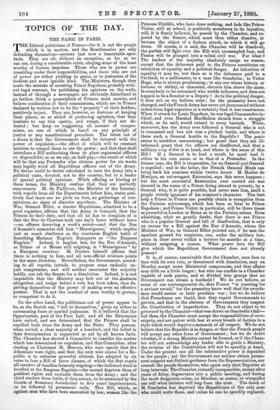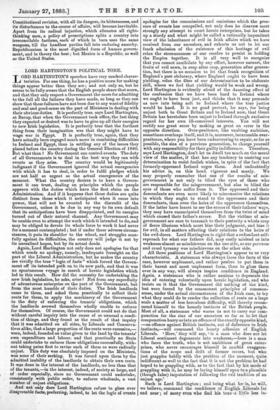TOPICS OF THE DAY.
THE PANIC IN PARIS.
THE Liberal politicians of France—for it is not the people which is in motion, and the Reactionaries are only defending themselves—present just now a lamentable spec- tacle. They are all, without an exception, so far as we can see, during a considerable crisis, obeying some of the least worthy of human impulses. Those who are in power are trembling under their responsibilities, and those who are out of power are either yielding to panic, or to jealousies of the feeblest and most ignoble kind. The Ministers, though they made the mistake of arresting Prince Napoleon, probably with- out legal warrant, for publishing his opinions on the walls, instead of through a newspaper, are obviously disinclined to go farther, think a proscription of Princes most unwise, and believe confiscation of their commissions, which are in France declared by written law to be the " property " of their holders, positively unjust. They are, however, so desirous of keeping their places, or so afraid of producing agitation, that they hesitate to say this openly, and resign, if they are de- feated ; but keep on suggesting all manner of compro- mises, no one of which is based on any principle of justice or any constitutional precedent. The latest out of a dozen is that the Government shall be invested with the power of expulsion,—the effect of which will be constant motions to compel them to use the power ; and that they shall introduce a Bill authorising them to place regimental officers en disponibilite', or as we say, on half-pay,--the result of which will be that any Pretender who obtains power for six weeks may legally weed all Republican officers out of the Army. No device could be better calculated to turn the Army into a political caste, devoted, not to the country, but to a leader of special political opinions. While offering or hinting at these terms, the Ministry confess that they are perfectly unnecessary. M. de Faillieres, the Minister of the Interior, with reports from all the Departments before him, states posi- tively that there are no plots on foot, no gatherings of con- spirators, no signs of disorder anywhere. The Minister of War, General Billot, a sincere Republican, admitted to be a good organiser, affirms that the Army is tranquil, that the Princes do their duty, and that all he has to complain of is that the Due de Chartres took one day's leave without leave —an offence deserving a week's arrest—and that the Due d'Aumale's comrades call him "Monseigneur," which implies just as much obedience as the courteous English habit of describing Madame Eugenie Bonaparte as "the Empress Eugenie." Indeed, it implies less, for the Due d'Aumale, as Prince of a House still reigning, is " Monseigneur " by a European courtesy. M. Duclerc himself affirms that there is nothing to fear, and all non-official evidence points in the same direction. Nevertheless, the Government, accord- ing to all reports, intends to propose some radically un- just compromise, and will neither encounter the majority boldly, nor ask the Senate for a dissolution. Indeed, it is not impossible that the Ministry may bolt out of the .business altogether, and resign before a vote has been taken, thus de- priving themselves of the power of making even an effective protest. That is not the conduct of men worthy to govern, or competent to do it.
On the other hand, the politicians out of power appear to be, as the Scotch say, "left to themselves," given up either to unreasoning fears or morbid jealousies. It is believed that the Opportunists, part of the Pure Left, and all the Extremists have united, and are determined that the Princes shall be expelled both from the Army and the State. They possess, when united, a clear majority of a hundred, and the belief in their determination is supported as yet by all known facts. The Chamber has elected a Committee to consider the matter which has determined on expulsion, and that Committee, after electing as Chairman M. Marcou, who says openly that the Athenians were right, and that the only wise course for a Re- public is to ostracise powerful citizens, has adopted by six votes to four a Bill of three clauses, of which the first expels all members of families formerly reigning—the italicised word is levelled at the Empress Eugenie—the second deprives them of political rights and excludes them from the Army ; and the third renders them liable, if they return, to be sentenced by the Courts of Summary Jurisdiction to five years' imprisonment, to be followed by permanent exile. This Bill, which, as against men who have been amnestied by law, women like the
Princess Clotilde, who have done nothing, and lads like Prince- Victor, still at school, is positively monstrous in its injustice, will, it is firmly believed, be passed by the Chamber, and re- jected by the Senate, which must then either dissolve, or become the object of a furious attack, in which it will go. down. Of course, it is said, the Chamber will be dissolved, the parties will fight over the Bill with unexampled fury, and France will be plunged into a veiled civil war. For what ?1 The leaders of the majority absolutely assign no reason, except that the deference paid to the Princes constitutes an infraction of equality and a political danger. An infraction of equality it may be, but then so is the deference paid to a. Cardinal, to a millionaire, to a man like Gambetta ; to Victor Hugo, who is always proclaiming ; to any one whose history, or fortune, or ability, or character, elevates him above the mass. Is everybody to be ostracised who wields influence, and does not happen to be a Senator or a Deputy ? As to the political danger, it does not, as we believe, exist ; for the peasantry have not changed, and the French Army has never yet pronounced without orders from legal superiors or a certainty that it was unanimous. When it struck for Louis Napoleon, he was legal Commander-in- Chief, and even Marshal Madiahon shrank from a struggle which, as he said, would extend to every barrack. When, moreover, has the Army ever followed a General who is not in command and has not won a pitched battle, and where is there such a General hostile to the Republic ? The panic. seems to outsiders unreasoning ; but grant that they are ill- informed, grant that the officers are disaffected, and that a military coup d'e'tat is at hand, and where is the sense of this Bill ? If a General is to lead a revolt, he must lead it either in his own name, or in that of a Pretender. In the. former case, the Bill is inoperative, for no General quei General is expelled ; and in the latter, the French General Monk can bring back his nominee within twelve hours. M. Madier Montjau, an extravagant Extremist, says this never happens ;. but the most successful Restoration ever carried out was decreed in the name of a Prince living abroad in poverty, by a General who, it is quite possible, had never seen him, amid a people utterly ignorant of his nominee's character. The best help a Prince in France can possibly obtain is exemption from the Parisian microscope, which has been so fatal to Prince Napoleon ; and Prince Victor, in particular, will be three times as powerful in London or Rome as in the Parisian salons. Even admitting, what we greatly doubt, that there is one Prince who is a popular General and full of disaffection, that is only an excuse for a Bill against the Due d'Aumale, whom the Minister of War, as General Billet pointed out, if he sees the smallest ground for suspicion, can, under the military law, place in close arrest within a fortress for months at a time, without assigning a reason. What power does the Bill give which the Republican Government does not already possess?
It is, of course, conceivable that the Chamber, once face to face with its own vote' or threatened with dissolution, may on. Monday accept some Ministerial compromise, and that affairs may drift on a little longer • but who can confide in a Chamber capable of such panics, an so divided into groups that no Government can obtain a foothold ? We do not believe, as some of our contemporaries do, that France "is yearning for a saviour sword," for the peasantry know well that the swords- man would sooner or later proclaim war ; but we do believe-. that Frenchmen are timid, that they expect Governments to govern, and that in the absence of Governments they suspect the Constitution of imperfection. They do not object to be governed by the Chamber—that was shown on Gambetta's fall— but then, the Chamber must accept the responsibilities of sove- reignty, and not quiver with fear at every breath of faction in a style which would deprive a monarch of all respect. We do not believe that the Republic is in danger, or that the French people will accept any other form of Government ; but we do doubt whether, if a strong Ministry cannot be formed, or if the Cham- ber will not acknowledge any leader able to guide a Ministry, the revision of the Constitution will not be speedily at hand. Under the present one all the substantive power is deposited in the people ; yet the Government can neither obtain perma- nent support nor distinct guidance from the Representatives, nor consult the people themselves, who again only elect Deputies at long intervals. The Chamber, virtually irresponsible, except after years of delay, degenerates into a public meeting, and during the most dangerous crises, no Minister, or orator, or wirepuller can tell what decision will leap from the urns. The death of M. Gambetta has deprived the Republicans of the only man who could unite them, and unless he can be speedily replaced, Constitutional revision, with all its dangers, its bitternesses, and its disturbances to the course of affairs, will become inevitable. Apart from its radical injustice, which alienates all right- thinking men, a policy of proscriptions splits a country into irreconcilable factions, each of which in turn uses the same weapons, till the headless parties fall into enduring anarchy. Republicanism is the most dignified form of human govern- ment, and in theory the best ; but Mexico is a Republic, as well as the United States.







































 Previous page
Previous page